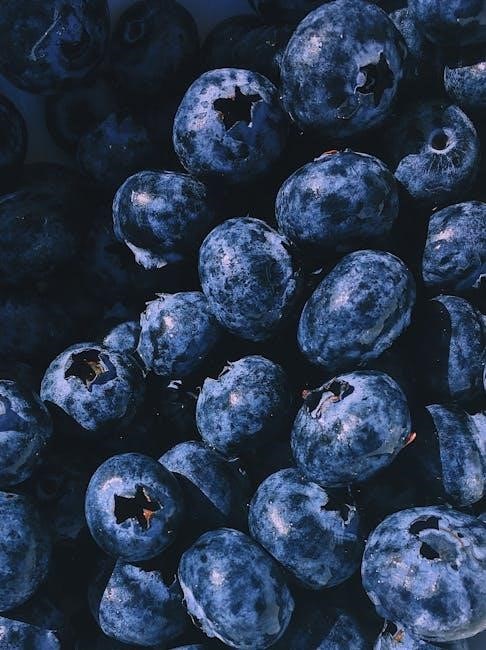Superfoods are nutrient-dense foods offering exceptional health benefits. They’ve gained popularity for their role in boosting energy, improving digestion, and supporting immune function. Incorporating them into meals can enhance overall well-being.
Understanding Superfoods and Their Importance
Superfoods are nutrient-rich foods that provide exceptional health benefits due to their high concentration of vitamins, minerals, and antioxidants. These foods are often associated with reducing the risk of chronic diseases like heart disease and diabetes. They are also known to boost energy levels, improve digestion, and support immune function. Superfoods are versatile and can be easily incorporated into daily meals, making them a practical choice for enhancing overall well-being. Their importance lies in their ability to promote long-term health and vitality, making them a cornerstone of a balanced diet.

What Are Superfoods?
Superfoods are nutrient-dense foods rich in vitamins, minerals, and antioxidants, offering exceptional health benefits like boosting energy, improving digestion, and supporting immune function for overall well-being.
Definition and Classification of Superfoods
Superfoods are foods exceptionally rich in nutrients, offering high nutritional value and potential health benefits. They are typically classified into categories such as fruits, vegetables, whole grains, proteins, and healthy fats. These foods are often packed with vitamins, minerals, antioxidants, and phytochemicals, which contribute to their health-enhancing properties. Examples include berries, leafy greens, nuts, seeds, and fatty fish like salmon. While not formally defined by regulatory bodies, superfoods are recognized for their ability to support overall well-being and reduce the risk of chronic diseases. They are celebrated for their dense nutrient profiles and versatility in promoting a balanced diet.
Historical Use of Superfoods in Different Cultures
Superfoods have been integral to ancient cultures worldwide, valued for their nutritional and medicinal properties. The Inca Empire revered quinoa and maca for energy and vitality, while Ayurvedic traditions in India emphasized turmeric and ginger for their healing benefits. In traditional Chinese medicine, goji berries and green tea were consumed for longevity and balance. Indigenous cultures relied on wild berries, nuts, and seeds for sustenance. Fermented foods like kimchi and sauerkraut were staples in Asian and European diets, promoting gut health. These foods were often considered sacred, used in rituals and daily meals to enhance well-being and spiritual connection. Their historical significance underscores their enduring importance in modern nutrition.
Health Benefits of Superfoods
Superfoods enhance mental clarity, support healthy aging, and promote detoxification. They improve skin health, reduce inflammation, and boost energy levels naturally, making them a cornerstone of holistic wellness.
Nutritional Value and Health Advantages
Superfoods are packed with vitamins, minerals, and antioxidants, offering remarkable health advantages. They provide essential nutrients like fiber, omega-3 fatty acids, and vitamins A, C, and E. These foods combat oxidative stress, reducing inflammation and improving heart health. Their high antioxidant content helps protect against chronic diseases, such as cancer and diabetes. Additionally, superfoods support brain function, enhancing cognitive performance and mental clarity. Incorporating them into your diet can boost energy levels, strengthen the immune system, and promote overall well-being, making them a vital component of a healthy lifestyle.
Role in Preventing Chronic Diseases
Superfoods play a crucial role in preventing chronic diseases due to their high nutrient density and antioxidant properties. They help reduce inflammation, a key factor in conditions like heart disease and diabetes. Rich in fiber, omega-3 fatty acids, and essential vitamins, superfoods support cardiovascular health and regulate blood sugar levels. Their antioxidant content combats oxidative stress, lowering the risk of cancer and neurodegenerative diseases. Regular consumption of these foods promotes a balanced diet, enhancing the body’s ability to fight off chronic illnesses and maintain long-term health. Incorporating superfoods is a proactive step toward disease prevention and overall well-being.

Types of Superfoods
Superfoods include berries, leafy greens, nuts, seeds, and fish, each offering unique nutritional benefits. They are classified based on their origins and high vitamin, mineral content.
Common Superfoods and Their Origins
Blueberries, native to North America, are renowned for their antioxidants. Spinach, originating from Persia, is rich in iron; Salmon, from the Atlantic and Pacific oceans, provides omega-3 fatty acids. Quinoa, a grain from the Andean region, is a complete protein. Acai berries, found in the Amazon rainforest, are packed with vitamins. Turmeric, native to India, is celebrated for its anti-inflammatory properties. These superfoods are celebrated globally for their nutrient-rich profiles and diverse health benefits, making them staples in modern diets.
Lesser-Known Superfoods with High Nutritional Value
Moringa, native to India, is a powerhouse of vitamins and minerals. Lucuma, a Peruvian fruit, is rich in antioxidants and beta-carotene. Maqui berries, from Chile, boast high anthocyanin levels. Gac fruit, commonly found in Southeast Asia, is a vitamin A powerhouse. These superfoods, though less mainstream, offer remarkable health benefits, including improved digestion and immune support. Incorporating them into your diet can provide essential nutrients and enhance overall well-being. Their versatility in recipes makes them easy to add to meals for a nutritional boost.
Incorporating Superfoods Into Your Diet
Add superfoods like berries, spinach, and chia seeds to smoothies, salads, or yogurt for a nutrient boost. Try recipes for energy bars or overnight oats.
Practical Tips for Adding Superfoods to Meals
Start by incorporating small portions of superfoods into daily meals. Add spinach to smoothies or eggs for a nutrient-packed breakfast. Mix chia seeds into yogurt or oatmeal for extra fiber. Use Goji berries as a topping for salads or desserts. Substitute regular snacks with energy balls made from dates, nuts, and cocoa powder. Sneak kale into soups or pasta dishes for an unnoticed nutritional boost. Experiment with recipes that blend superfoods seamlessly, ensuring meals remain flavorful and balanced while enhancing overall well-being.
Superfood Recipes for Breakfast, Lunch, and Dinner
Start your day with a chia pudding breakfast bowl: mix chia seeds with almond milk, let sit overnight, and top with fresh berries. For lunch, create a kale and quinoa salad with roasted sweet potatoes, avocado, and a citrus vinaigrette. Dinner can feature a spirulina-enhanced stir-fry with salmon, mixed vegetables, and turmeric for added anti-inflammatory benefits. These recipes blend superfoods seamlessly, offering balanced nutrition and vibrant flavors. Experiment with ingredients like Goji berries, spinach, and maca powder to enhance meals and reap their health rewards throughout the day.

Selecting and Storing Superfoods
Choose fresh, vibrant superfoods to ensure maximum nutrient retention. Store them in airtight containers or refrigerate for longevity, maintaining their health-enhancing properties effectively over time.
How to Choose Fresh and Nutrient-Rich Superfoods
Selecting fresh and nutrient-rich superfoods is essential for maximizing their health benefits. Look for vibrant colors and avoid wilted or damaged items. For fruits and vegetables, choose seasonal and organic options when possible, as they tend to have higher nutrient content and fewer pesticides. When purchasing packaged superfoods like nuts or seeds, opt for unsalted, unsweetened versions to avoid added sugars and unhealthy fats. Check expiration dates to ensure freshness, and store them in airtight containers to preserve nutrients. This approach ensures you get the most out of your superfoods.
Best Practices for Storing Superfoods
Proper storage is key to preserving the nutritional value of superfoods. Store them in airtight containers to prevent moisture and air exposure, which can degrade nutrients. Keep superfoods like nuts, seeds, and dried fruits in a cool, dark place or refrigerate for longer freshness. Freezing is ideal for berries and leafy greens to retain vitamins and antioxidants. Avoid exposure to heat sources, as this can diminish their potency. Regularly check expiration dates and consume within recommended periods. By following these practices, you ensure your superfoods remain nutrient-rich and fresh for optimal health benefits.

Superfoods for Specific Health Needs
Superfoods cater to various health needs, offering targeted benefits like improved digestion, enhanced energy, and boosted immunity, while supporting skin health and mental clarity.
Superfoods That Improve Digestion
Certain superfoods are renowned for their digestive benefits, helping to maintain a healthy gut and prevent issues like bloating or indigestion. Fermented foods like kimchi and sauerkraut are rich in probiotics, which support gut microbiota balance. Chia seeds, high in fiber, promote regular bowel movements and prevent constipation. Leafy greens such as kale and spinach provide essential vitamins and minerals that aid digestion. Additionally, ginger and turmeric have natural anti-inflammatory properties, easing digestive discomfort. Incorporating these superfoods into your diet can enhance digestive health, ensuring proper nutrient absorption and overall well-being.
Superfoods That Boost Energy Levels
Certain superfoods are known to naturally enhance energy levels and combat fatigue. Goji berries, rich in vitamins and antioxidants, help sustain vitality throughout the day. Maca root, a traditional Peruvian superfood, is celebrated for its ability to balance energy and improve mental clarity. Cacao nibs, packed with magnesium and iron, support healthy blood flow and oxygen delivery to cells. Bee pollen, a complete nutrient source, boosts stamina and reduces fatigue. Incorporating these superfoods into your diet can provide a natural energy boost, helping you maintain productivity and vitality without relying on stimulants.
Superfoods That Support Immune Function
Superfoods play a crucial role in enhancing and maintaining immune function. Elderberries are renowned for their high vitamin C content and antiviral properties, making them a potent immune booster. Turmeric, with its active compound curcumin, has powerful anti-inflammatory and antimicrobial effects. Garlic contains allicin, which fights off pathogens and strengthens the immune system. Additionally, reishi mushrooms are adaptogens that support immune balance and resilience. Incorporating these superfoods into your diet can help fortify your body’s defense mechanisms, reducing the risk of illness and promoting overall health and vitality.
Superfoods for Skin Health
Superfoods are packed with nutrients that promote healthy, glowing skin. Blueberries, rich in antioxidants, combat free radicals that cause skin aging. Walnuts, high in omega-3 fatty acids, reduce inflammation and improve skin elasticity. Leafy greens like spinach provide vitamins A and E, protecting skin from damage. Pomegranates contain ellagic acid, which fights UV-induced damage. Turmeric’s curcumin reduces inflammation, while acai berries offer antioxidants for anti-aging benefits. Incorporating these superfoods into your diet can enhance skin health, reduce the appearance of fine lines, and support a radiant complexion, making them essential for a natural skincare routine.
Superfoods for Mental Well-being
Superfoods play a vital role in supporting mental health by providing essential nutrients for brain function. Fatty fish like salmon are rich in omega-3 fatty acids, which reduce depression and anxiety. Turmeric contains curcumin, an anti-inflammatory compound that improves mood. Dark chocolate, with its flavonoids, enhances cognitive function and reduces stress. Leafy greens like spinach offer folate, crucial for neurotransmitter production. Nuts and seeds, such as almonds and pumpkin seeds, provide magnesium and zinc, which combat stress and improve focus. Incorporating these superfoods into your diet can promote emotional balance, reduce symptoms of mental health disorders, and support overall brain health.
Superfoods are powerful tools for enhancing health and well-being. Rich in nutrients, they support energy, digestion, and immunity, making them essential for a balanced and vibrant lifestyle.
Final Thoughts on Superfoods and Their Impact on Health
Superfoods are a cornerstone of a healthy diet, offering exceptional nutritional value and diverse health benefits. By incorporating foods like berries, leafy greens, and nuts, individuals can enhance energy levels, support immune function, and reduce chronic disease risks. These nutrient-dense options not only improve physical well-being but also promote mental clarity and skin health. Practical tips, such as adding superfoods to meals or storing them properly, make it easy to embrace their benefits. Ultimately, superfoods empower individuals to take control of their health, fostering a balanced and vibrant lifestyle. Their impact is undeniable, making them a wise choice for long-term wellness.



